Unit 3 A taste of English humour
2020版高考英语大一轮复习第1部分Unit3AtasteofEnglishhumour教案(含解析)新人教版必修4
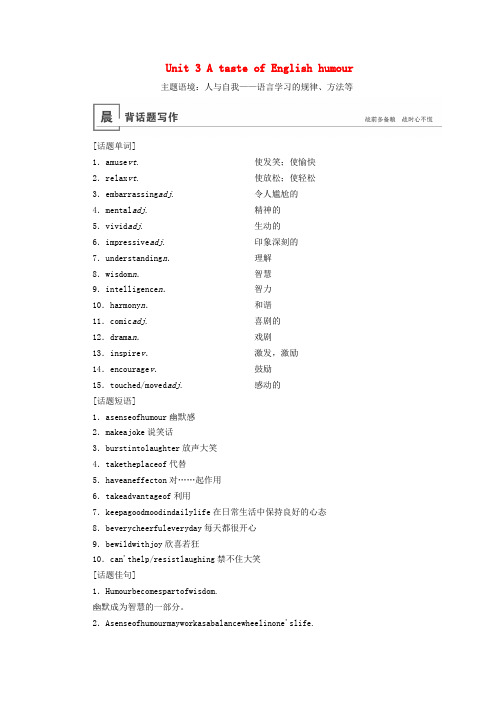
Unit 3 A taste of English humour主题语境:人与自我——语言学习的规律、方法等[话题单词]1.amuse vt. 使发笑;使愉快2.relax vt. 使放松;使轻松3.embarrassing adj. 令人尴尬的4.mental adj. 精神的5.vivid adj. 生动的6.impressive adj. 印象深刻的7.understanding n.理解8.wisdom n.智慧9.intelligence n.智力10.harmony n.和谐11.comic adj. 喜剧的12.drama n.戏剧13.inspire v.激发,激励14.encourage v.鼓励15.touched/moved adj. 感动的[话题短语]1.asenseofhumour幽默感2.makeajoke说笑话3.burstintolaughter放声大笑4.taketheplaceof代替5.haveaneffecton对……起作用6.takeadvantageof利用7.keepagoodmoodindailylife在日常生活中保持良好的心态8.beverycheerfuleveryday每天都很开心9.bewildwithjoy欣喜若狂10.can'thelp/resistlaughing禁不住大笑[话题佳句]1.Humourbecomespartofwisdom.幽默成为智慧的一部分。
2.Asenseofhumourmayworkasabalancewheelinone'slife.幽默感可以在人的生活中起调节作用。
3.Havingthesenseofhumouristhevaluabletreasureofahuman-being.具有幽默感是一个人的宝贵财富。
[佳作背诵]假设你是李华,喜欢学习英语,在学习的过程中发现自己看不懂一些英语笑话,请根据以下要点给某英文报刊编辑写一封信就这一问题进行咨询。
(完整版)高中英语人教版必修四Unit3ATasteofEnglishHumourlanguagePoints教案系列一

Unit 3 A taste of English humourLanguage points教案Teaching goals1.Target languagea. Humour, comedy, content, performer , astonish , fortunate, ordinary, bored, entertain , throughout, homeless, moustache, worn, failure, overcome, leather, pick out.b Make Ss get knowledge of the new words and phrases.2.Ability goalsGet Ss to use some useful new words and expressions correctly.Enable Ss to make sentences with the useful sentence patterns.3.Learning ability goalsTo help students master the important language points.To help students to make sentences by using the words and phrases.Teaching important pointsGet Ss to master the usage of the words and phrases.Teaching difficult pointshelp students get knowledge of the language points.Teaching methodsInspiration, Questioning and Discussion.Teaching aidsA computer, a projector and a recorder.Teaching proceduresStep I , review the new words and phrases.Step II. Teaching the important language points一.词语辨析1. specially / especially / particularly【解释】specially = on purpose故意地;专门地 (不是为了别的,而只是为了某一目的而专门采用的某种方式。
高中英语必修四unit3词汇短语详解
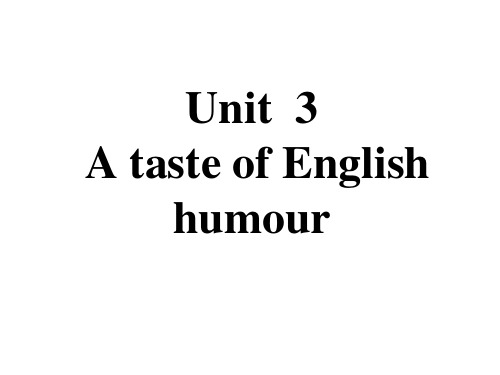
• • • • • • • • • •
11.adj. 无家可归的 11.homeless 12. moustache 12.n. 小胡子 13.adj. 用旧/破烂的 13.worn 14.n. 失败(者) 14.failure 15.overcome 15.v. 战胜;克服 16.leather 16.n. 皮革 17.chew 17.v.嚼碎;咀嚼 18.convince 18.v. 使信服 19.adj. 令人信服的 19.convincing 20.v.导演,指示,指挥 20.direct
Unit 3 A taste of English humour
• • • • • • • • • •
1.adj. 满足的 n. 满足 1. content 2.n. 表演者/演出者 2.performer 3.astonish 3.v. 使惊诧 4.adj. 令人惊讶的 4.astonishing 5.adj. 幸运/吉利的 5.fortunate 6.unfortunately 6.adv. 不幸地 7.adj. 平常的,普通的 7. ordinary 8.bored 8.adj. 厌烦的 9.entertain 9.v. 使欢乐,款待 10. prep. 遍及;贯穿 10. throughout
• • • • • • •
21. adj.杰出的 21.outstanding 22.Switzerland 22.n. 瑞士 23.n./v. 姿态;手势 23.gesture 24.adj.特殊的 n.细节 24.particular 25.n. 时刻,场合 25.occasion 26.n. 预算,开支 26.budget 27.actress 27.n. 女演员 • 28.v.& n.滑动;幻灯片28.slide • 29.直到现在 29.up to now • 30.对…满意 30.be content with
人教新课标高中英语必修4第三单元A Taste of English Humour早读材料和检测含答案
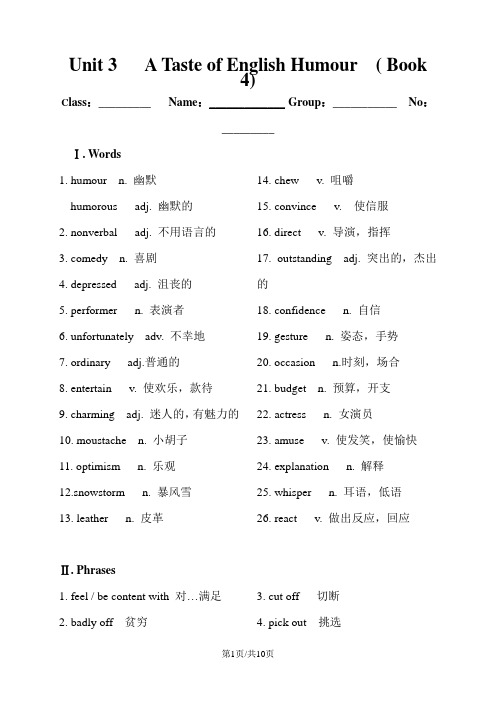
Unit 3 A Taste of English Humour ( Book4)C lass:_________ Name:_____________ Group:___________ No:_________Ⅰ. Words1. humour n. 幽默humorous adj. 幽默的2. nonverbal adj. 不用语言的3. comedy n. 喜剧4. depressed adj. 沮丧的5. performer n. 表演者6. unfortunately adv. 不幸地7. ordinary adj.普通的8. entertain v. 使欢乐,款待9. charming adj. 迷人的,有魅力的10. moustache n. 小胡子11. optimism n. 乐观12.snowstorm n. 暴风雪13. leather n. 皮革14. chew v. 咀嚼15. convince v. 使信服16. direct v. 导演,指挥17. outstanding adj. 突出的,杰出的18. confidence n. 自信19. gesture n. 姿态,手势20. occasion n.时刻,场合21. budget n. 预算,开支22. actress n. 女演员23. amuse v. 使发笑,使愉快24. explanation n. 解释25. whisper n. 耳语,低语26. react v. 做出反应,回应Ⅱ. Phrases1. feel / be content with 对…满足2. badly off 贫穷3. cut off 切断4. pick out 挑选5. star in 主演6. (be) in search of 寻找7. overcome difficulty 克服困难8. be caught in 被…困住9. up to now 到目前为止10. brighten people’s lives照亮人们的生活11. as time goes by 随着时间的流逝12. throughout the world 遍布全世界13. worn-out shoes 破旧的鞋子14. a walking stick 拐杖15. social failure 社会生活中的失败者16. the Gold Rush 淘金热17. mid-nineteenth century 19世纪中18. on the edge of 在…的边缘19. outstanding work in films在电影业中的杰出工作20. a sense of humour 幽默感Ⅲ. Sentences1. 过去他们很贫困,根本谈不上度假。
人教版高中英语必修四 Unit3 A tasteof English humour-词汇篇(学生版)

人教版高中英语必修四 Unit3 A tasteof English humour-词汇篇(学生版)face.他对这次竞赛中获得第二名很满意,因此脸上露出了满意的微笑。
2. break into强行进入,破门而入;撬开(汽车等);突然开始(笑、哭)break away from摆脱;脱离,背叛(政党、国家等) break down出故障;失败;垮掉break in强行闯入,打断break out爆发;突然发生break through突围;突破break up粉碎;结束;散开;(学校)期终放假break off断开;停顿;突然中止E.g. The thief broke away from the police and ran into the woods.小偷摆脱了警察跑进了树林。
E.g. Don't break in while others are speaking.别人讲话时不要插话。
E.g. The car I was in broke down, so I had to walk home.我坐的车抛锚了,所以我不得不走路回家。
E.g. A big fire broke out in the town last night.昨天晚上镇里着了大火。
E.g. The meeting broke up without a result.会议没有得出结果就结束了。
E.g. Strong will can almost break through everything.顽强的意志几乎可以战胜一切。
3. persuade/convincepersuade 着重利用督促、劝告来感动和影响听者,使其愿意相信某事或参与某种行为E.g. I persuade him to quit smokingconvince指用理论、证据等理智方面的因素使别人相信4. as/withAs (conj.)随着,常用来引导时间状语从句With(prep.)随着,后接名词或复合宾语,不引导从句E.g. He gave me so many facts that convinced me.三、要点梳理1. content(1)adj.满足的;满意的①We shouldn't be content with the achievements already gained.我们决不能满足于已取得的成绩。
A taste of english humour

For his lifetime outstanding work. / For the contributions he made in films.
Notes about Charlie Chaplin’s career
Born Died Job Type of acting Character Costume Reason for success 1889 1977 actor mime and farce “the tramp”, a poor and homeless person Large trousers, worn-out shoes and small round black hat Charming ,social failure with a determination to overcome difficulties and always kind
Unit3 A Taste ofEnglish Humor
小插曲
掌握这26个字母, 可能改变你的一生
•A--Acknowledging(感激) 感激上帝给予你的一切。
•B--Belief(信念) 做每一件事要有坚定的信念。 •C--Confidence(信心) 对自己充满自信心。 •D--Dreaming(梦想) 有空不妨做做白日梦。
1) content (adj.): satisfied, happy, not wanting more 满足,满意,知足。
常见搭配:be content with sth.
be content to do sth. be content that… 如: Are you content with your present
Fill in the blanks
必修四Unit 3 A taste of English humour
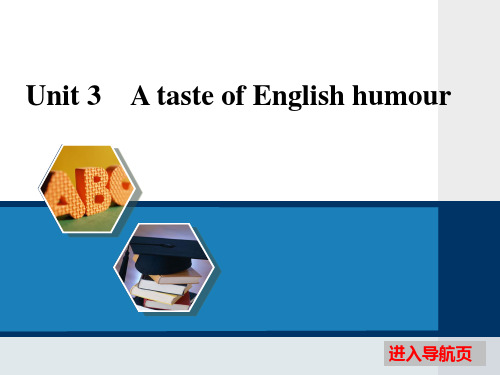
返回导航页 结束放映
Unit 3 A taste of English humour
Ⅱ.短语—在应用中记牢,在归纳中记多 [写得准]
1. feel/be content with
对……满足
2.up to now
直到现在
3.badly off
→directly adv.直接地;立刻地→direction n.方向
→director n.导演
9.depressed adj.忧愁的;沮丧的→depressing adj.使人沮丧的
→depression n.沮丧;不高兴
10.fortune n.幸运;财富→fortunate adj.幸运的;吉利的
12.convince vt.使信服→convincing adj.令人信服的→convinced
adj.确信的;深信的 13.particular adj.特殊的;特别的 n.细节;细目
→particularly adv.尤其;特别地 14.humour n.幽默;滑稽→humourous adj.幽默的 15.astonish vt.使惊诧→astonishing adj.令人感到惊讶的
→astonished adj.惊讶的 16.performer n.表演者;演出者→perform v.执行;表演
→performance n.执行;演出
返回导航页 结束放映
Unit 3 A taste of English humour
[用得活]
用所给词的适当形式填空 1.According to my own understanding, a good teacher is also a
Unit 3 A taste of English humour主题语境:人与自我——语言学习的规律、方法等
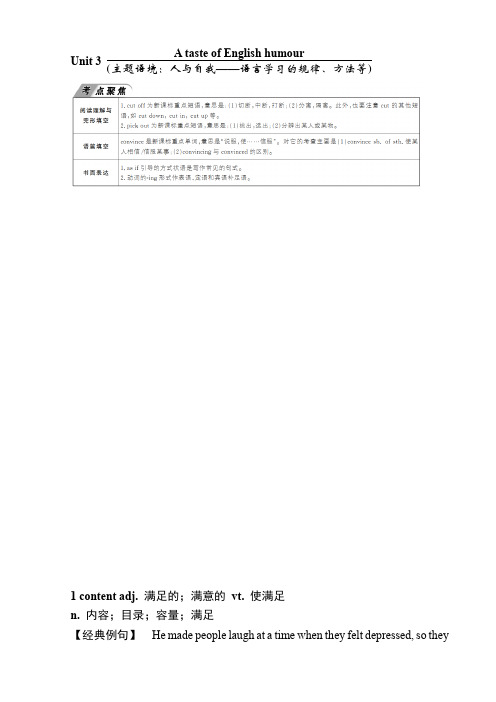
Unit 3A taste of English humour(主题语境:人与自我——语言学习的规律、方法等)1 content adj. 满足的;满意的vt. 使满足n. 内容;目录;容量;满足【经典例句】He made people laugh at a time when they felt depressed, so theycould feel more content with their lives.在人们感到沮丧的时候,他可以使他们开怀大笑,于是人们就对自己的生活感到比较满足。
(1)be content to do sth. 乐于做某事be content with... 对……满足/满意(2)content oneself with... 满足于……;使(某人)自己对……感到满足温馨提示:“对……满意”的常用短语小结:be content with; be pleased with; be satisfied with; be happy with。
[基础练习]——单句语法填空(1)Those who are content _with their present situations will surely make no difference in life.(2)That rich man is tired of city life, so he is content _to_live (live) in the country.[能力提升]——一句多译(3)我们不应该使自己仅仅满足于课本知识。
①We shouldn't _be_content_with_the_knowledge learned from the books. (content adj.)②We should _never_content_ourselves_with_the_knowledge learned from the books. (content v t.)2 astonish vt. 使惊诧【经典例句】It astonished us that she should marry a sugar daddy.她竟然嫁给了一位有钱的老男人太令人惊讶了。
Unit3 A taste of English humour
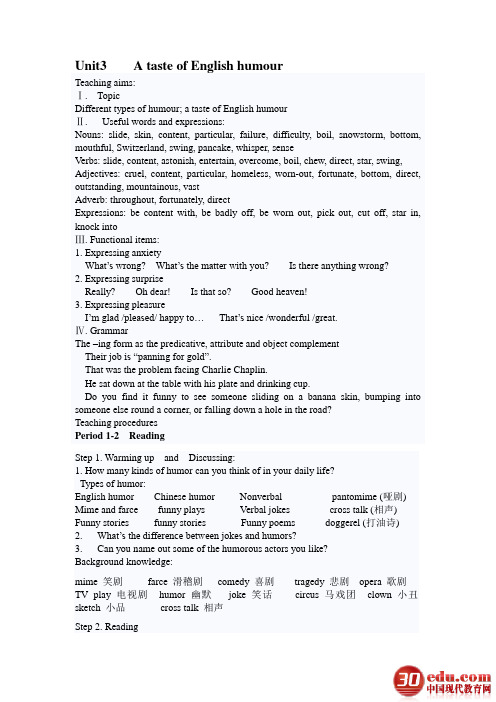
Unit3 A taste of English humourTeaching aims:Ⅰ. TopicDifferent types of humour; a taste of English humourⅡ. Useful words and expressions:Nouns: slide, skin, content, particular, failure, difficulty, boil, snowstorm, bottom, mouthful, Switzerland, swing, pancake, whisper, senseVerbs: slide, content, astonish, entertain, overcome, boil, chew, direct, star, swing, Adjectives: cruel, content, particular, homeless, worn-out, fortunate, bottom, direct, outstanding, mountainous, vastAdverb: throughout, fortunately, directExpressions: be content with, be badly off, be worn out, pick out, cut off, star in, knock intoⅢ. Functional items:1. Expressing anxietyWhat’s wrong? What’s the matter with you?Is there anything wrong?2. Expressing surpriseReally? Oh dear! Is that so? Good heaven!3. Expressing pleasureI’m glad /pleased/ happy to…That’s n ice /wonderful /great.Ⅳ. GrammarThe –ing form as the predicative, attribute and object complementTheir job is “panning for gold”.That was the problem facing Charlie Chaplin.He sat down at the table with his plate and drinking cup.Do you find it funny to see someone sliding on a banana skin, bumping into someone else round a corner, or falling down a hole in the road?Teaching proceduresPeriod 1-2 ReadingStep 1. Warming up and Discussing:1. How many kinds of humor can you think of in your daily life?Types of humor:English humor Chinese humor Nonverbal pantomime (哑剧) Mime and farce funny plays Verbal jokes cross talk (相声) Funny stories funny stories Funny poems doggerel (打油诗)2. What’s the difference between jokes and humors?3. Can you name out some of the humorous actors you like?Background knowledge:mime 笑剧farce 滑稽剧comedy 喜剧tragedy 悲剧opera 歌剧TV play 电视剧humor 幽默joke 笑话circus 马戏团clown 小丑sketch 小品cross talk 相声Step 2. ReadingTask 2: Ss read and answer the following questions:1. What’s the passage mainly about?A. The history of English humor.B. The films Chaplin made.C. The humor Chaplin made in his film.D. The Gold Rush in California.2. How many parts can the passage be divided into?A. 2B. 3C. 4D. 53. People enjoy seeing other people’s bad luck because _______.A. they enjoy doing soB. it makes people more worried about their lifeC. it makes people more content with their lifeD. there’s much fu n in doing so4. Chaplin was given a special Oscar for __________.A. the characters he played in his filmsB. the films he directedC. the joy he gave us in his filmsD. the contributions he made in films Task 2: Ss read and fill the following chart:Period 3-4. Language learningStep 1. Revision Ss retell the text with their own words.Step 2. Language points1. find /think/ feel it + adj./n + to do sth.We find it important to learn English well.I feel it a great honour to be invited to the party.2. see sb. Doing See sb do See sb doneWe saw him stealing the book from the bookstore just now.He saw Tom go out of the classroom yesterday afternoon.His neighbour saw him often beaten by his father.3. Skin: The purse is made of crocodile skin.be all skins and bones 瘦的皮包骨头4. be cruel to Don’t be cruel to animals.It is cruel of sb. to do sth. It’s cruel of America to bomb Iraq.5. feel /be content with sth, be content to do sth.People of the city feel content with their life.Mary is content to sit in front of the television all night.6. be worse off be bet ter off7. astonish sb. with sth. to the astonishment of sb.be astonished at sth./ to do sthHe said he could astonish us with a good result in the final exam.To the astonishment of the teachers, he got the first in the competition.The teachers were astonished at his getting the first in the competition.The teachers were astonished to find that he got the first in the competition.8. worn-out : adj. 穿破的Worn out vt. vi 使…耗尽; 穿破/旧,Cheap socks wear out quickly. I am worn out by the hard work.9. failure un.失败cn. 失败的人或事His plans ended in failure. As a writer, he was a failure.10. be loved by sb. for sthDeng Xiaoping is loved by the Chinese for his great contribution to China’s construction and social reform.11. star in : 担任主角This is an old film starred in by Charlie Chaplin.12. knock into He walked in such a hurry that he knocked into an old lady in the street.Step 3 Learning about language1. Ss do part 1 of the discovering useful words and expressions.2. Ss finish part 2, 3 and 4Step 4. Practice1. Ask the Ss to do Ex. 1and 2 on page 63.Period 5-6. ReadingStep 1. Pre-readingThe purpose of this reading is to introduce students to English jokes. Two kinds of jokes are shown here. The first shows now different meanings can make something amusing. This is called a “play on words”. The second kind of joke is s short funny story. Both jokes are very popular in English-speaking countries.Step 2. ReadingTask 1: Ss read and give their own answer to the question.Answer key for Exercise 1:1. B 2.C 3. ATask 2: Ss read part 2 and give their own answers to the two questions.Step 3. Reading task (page 59)Task 3: Ss read the passage and answer the following questions.1. What do children usually do on April Fool’s Day?2. Why did people believe the programme Panorama?3. Do you think the advice that the BBC gave people who asked how to grow noodle trees was serious? Give a reason.4. What would you do to find out whether a story like this was true.Task 4: Ss read and analyse the way that the BBC played this trick.Suggested answer:1. The panorama TV programme is serious and people believe it.2. The progrmme itself was presented in a very serious way.3. There were many details given in the story to make it believable.Task 5: Ss read and think if these things are true:1. that pigeons follow roads and road signs when they find their way home.2. that the earliest football has been found in a grave dated to 1000 years ago.3. that earliest human paintings on cave walls are all modern fakes.4. that advanced computers can “talk” to each other without the aid of humans. Period 7-8. Listening and speakingStep 1. Warm upAsk one of the Ss to tell the class a joke.Step 2. Pre-listeningThis is a story that English speaking people find funny. It is the kind of story that might happen to anybody who has a farm and chickens. At first let Ss read the questions to make sure that they know what they should do in this listening.Step 3 ListeningTask 1: Ss listen to the tape twice and finish Ex 1 and 2 on page 23.Step 4. SpeakingTask 2: Ss in pairs think of a funny story. It can be an English story or a Chinese story. Follow the following procedure:Prepare a joke and tell your partner in English.While telling your story, use the expression on your face and some acting to help make the story as funny as you can.After telling your story to your partner, let him/her give you some advice.Then let your partner tell his/her story.Finally tell your story to the class.Step 5. Listening (on page 55)This is a funny story for the students to enjoy. Ss should listen carefully and first try to understand the meaning.Task 3: Ss listen to the tape twice and finish Wb Ex 1 and 2 on page 55.Task 4: TalkingHumour make people laugh, feel happy and relaxed. Sometimes one person may find something funny while another person doesn’t find it amusing at all. So in pairs discuss with your partner what makes you laugh. Try to use the followingexpressions:I enjoy this very much because….It surprises me that …I laugh at that kind of thing because…This is fun because…I’m pleased we were both amused at…It is very amusing that…How wonderful /surprising!Period 9. Grammar:Step 1. Warm upReview what the Ss have learned about –ing as the subject and ObjectStep 2. The –ing form as predicative, attribute and object complementPredicative1. Seeing is believing.2. The music is exciting.Attribute1. There is a swimming pool in our school.2. China is a developing country..3. The person translating the songs can speak seven languages.4. The boy standing there is a classmate of mine.Object complement1. We heard her singing in her room.2. You can see them performing every night this week at the new theatre.3. We watch the children diving into the water from the diving board.Step 3. Practice1. Ss finish Ex 2 ,3and 4 on page 21.2. Ss do Wb Ex 1 and 2 on page 56.astonish depress play do ride amuse bark welcome3. Choose the suitable words from the box below and fill in the blanks in the correct form:1). I can’t imagine Bill________ a motorbike.2). Did you hear the dog downstairs _______ for most of the night?3). Frank is very good at telling funny jokes. He can be very ________.4). You can’t stop me _________ what I want.5). He gave me a ________ hug when he met me at theairport.6). Jim has really learnt very fast. She has made ________ progress.7). It’s been raining all day. This weather is __________.8). When I came out of the theatre, I noticed a group of children _________ musical instruments across the street.Keys: 1). riding 2). barking 3). amusing 4). doing5). welcoming 6). astonishing 7). depressing 8). playingPeriod 10. WritingStep 1. Pre-writingThis exercise lets students to write a funny story.Task 1: Ss gather information that they need and plan what they want to write.Step 2. While-writingTask 2: Ss write an English funny story or a Chinese one.Writing tips:Ss make a planSs write down their story in a logical order:First … Then …. Next…. Finally / At last…For each part of the story try to find the most interesting words you can to describe how you felt or what was happening.Then write out your story using these interesting words.Read through your story.Then show it to your partner. Let him/her suggest some new and exciting words. Help your partner with his/ her story.Write out the story and put it into a class collection of stories.。
高考英语 第1 基础知识解读 Unit 3 A taste of Engli

落堕市安心阳光实验学校Unit 3 A taste of English humourⅠ.写作单词——会拼写1.Content adj. 满足的;满意的n. 满足vt.使满足2.bored adj.厌烦的3.overcome vt.&vi. 战胜;克服4.slide vt.&vi. (使)滑动;(使)滑行n. 滑;滑动;幻灯片5.whisper n. 耳语;低语vt.&vi. 低语;小声说6.direct vt.&vi. 导演;指示;指挥adj.直的;直接的;直率的→directly adv. 直接地;径直地conj. 一……就→director n. 导演→direction n. 指导7.amuse vt.使发笑;使愉快→amusing adj.好笑的;有趣的→amused adj.愉快的→amusement n. 消遣;娱乐(活动) 8.react vi. 作出反应;回应→reaction n. 反应9.astonish vt.使惊诧→astonishing adj.令人感到惊讶的→astonished adj.惊讶的10.fortune n. 运气→fortunate adj.幸运的;吉利的→fortunately adv. 幸运地→unfortunately adv. 不幸地11.entertain vt.&vi. 使欢乐;款待→entertaining adj.愉快的;有趣的→entertainment n. 款待;娱乐12.fail v. 失败→failure n. 失败(者) 13.convince vt.使信服→convincing adj.令人信服的14.particular adj.特殊的;特别的n. 细节;细目→particularly adv. 特殊地;特别地15.depressed adj.忧愁的;沮丧的→depressing adj.使人沮丧的→depression n. 沮丧16.humour n. 幽默;滑稽→humourous adj.幽默的17.perform v. 执行;表演→performer n. 表演者;演出者→performance n. 执行;演出Ⅱ.阅读单词——要识记18.ordinary adj.平常的;普通的19.throughout prep. 遍及;贯穿adv. 到处;始终;全部20.chew vt.&vi. 嚼碎;咀嚼(食物) 21.outstanding adj.突出的;杰出的;显著的22.occasion n. 时刻;场合23.vast adj.巨大的;辽阔的24.mess n. 脏或乱的状态25.drunk adj.醉的26.homeless adj.无家的;无家可归的27.gesture n. 姿态;手势vi. 做手势28.explanation n. 解释;讲解;说明高频短语——会默写1.break into 强行闯入;进入2.up to now 直到现在3.pick out 挑出;辨别出4.cut off 切断;断绝5.feel/be content with 对……满足6.badly off 穷的;缺少的7.star in 担任主角;主演8.whisper to... 对……耳语9.pick up 偶尔获得;收听;好转10.react to 对……作出反应;回应教材原句——会背诵句式仿写——能应用1.As Victor Hugo once said, “Laughter is thesun that drives winter from the human face”...(as 引导定语从句) 1.常言道,熟能生巧。
必修四Unit3 A taste of English humour——感受英语的幽默
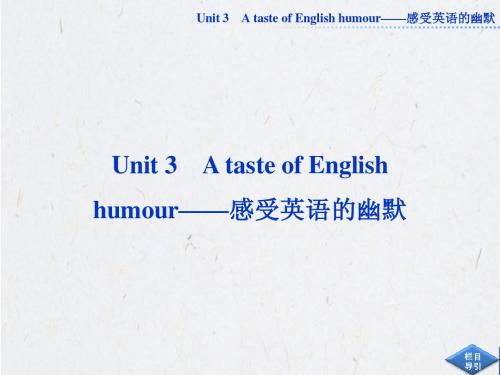
make readers laugh.
栏目 导引
Unit 3
A taste of English humour——感受英语的幽默
2.Jim had an accident yesterday. Fortunately ____________(幸运的是)he was not badly hurt. 3. Because of the war,many people became ____________(无家可归的) in homeless Libya.
sth.可知应用过去分词fixed。
栏目 导引
Unit 3
A taste of English humour——感受英语的幽默
5.(2012· 陕西教学质量检测)It looks like my cousin,but I don’t remember him__________a pair of glasses. A.to wear C.wear B.wore D.wearing
栏目 导引
Unit 3
A taste of English humour——感受英语的幽默
解析:选D。考查非谓语动词。句意为:
——和Mr. Smith说话的人是谁?——是
来我们公司采访发生的事情的当地记者。
答语是来回答who的提问,中心词是a local
journalist,后面的部分作定语来修饰
栏目 导引
Unit 3
A taste of English humour——感受英语的幽默
8.Seeing my arrival,he came over whispered and ______________(低语) something in my ear. 9.As a musician he was a
unit3_a_taste_of_English_humourlanguage points

到现在为止,已有大约30家外国公司在这个开发区设立了分
公司。 ②They have raised more than $1 000 000 for this project up to now/until now/so far. 到目前为止,他们已经为这个项目筹集到一百多万美元了。
(3)...nobody has been able to do this better than Charlie
温馨提示:
①当little意思为“小”的时候,要用such,不用so。 It is such a little sheep that it can’t run fast. 这只绵羊如此的小以至于不能跑快。 ②当that 前面是单数可数名词时,并且前面有形容词修饰, 两者可以互换。 He is such a kind man that we all like him. =He is so kind a man that we all like him. 他如此善良以至于我们都喜欢他。 ③so...that中的so位于句首时,要求后面的主句进行部分 倒装。 So fast did he run that I couldn’t catch up with him. 他跑得如此快以至于我赶不上他。
as 引导的定语从句常用在下列固定结构中
as is know to us 众所周知 as can be seen as we all know众所周知 看的出来 as is often the case情况常常如此 as may be imagined这可以想象出来 as often happens正如经常发生的那样 as has been pointed out正如已经指出的 那样 as has been said above正如上面所说 as we all can see正如我们所看到的那样 as is excepted 正如所预料的那样
人教版英语必修四Unit 3 A Taste of English Humour

direct sb. to do/ that sb. (should) do 指导/指示某人做某事 in all directions/ in every direction 四面八方
direct adv. & directly adv.& conj. direction n.
直接,径直& 直接地,立即;一…就 方向,指导,用法说明,操作指南
2020/04/13
4U3 A TASTE OF ENGLISH HUMOUR
3
2. astonishing adj. 令人惊讶的
【感悟用法】 (1) He was astonished____t_o_h__ea_r______ (hear) he had got the job. (2) To our great _a_st_o_n_i_s_h_m_e_n_t_ the boss wasn’t a_s_t_o_n_is_h_e_d__ at the a_s_t_o_n_is_h_i_n_g_
【用法总结】
feel/be content _____w_i_th___ sb./ sth. be well content ____t_o_d_o___ content oneself ____w__it_h___ sb./sth. content n.
对…满足/满意 (非常)满足于做;愿意做 满足于
6. Simple _d_i_r_e_c_ti_o_n_s_ (direct) for the model are printed on the box. 7. She is so particular ___a_b_o_u_t___ her housework that servants won’t work for
高中英语必修四 Unit 3 A taste of English humour 要点解析

c s. 不要 满 足于这 样小 的成 功 。 es
I a no o e twi a tf 1d e ms m tc ntn t be u iu r a :1 h
【 比较 辨析 】 oqe,vro ,eet cn uroecmedf a
这些 动 词 均含 “ 服 . 胜 ” 意 。c n 征 战 之 o— q e 侧重 战胜 和控 制 。书面用 词 。o ecm ur vro e 多指 战胜 或克 服非 物 质 的东西 , 困难 和不 如 良习惯 等 。 气较 弱 也可 指在 斗争 或竞 争 中 语
w n e ui l elis 我 不 满 足 于美 丽 的 a t a tu ra t . b f ie 梦想 , 我要 的是 美丽 的现 实 。
【 知识拓展 】
b / fe o t n t e e l c n e t wi h= b s t f d / e ai i se
你 的论 点太 薄 弱 了不 能令 我信 服 。
I o l n’ c n i c h m t t c u d t o v n e i ha he wa s
w o g 我无 法 使他 明 白 自己错 了。 rn .
We t o c n ic i o h ln 我 r t o vn e hm fte pa . y
奶油 , 我们 只好 吃干 面包 了 。
Do tbe o t n t u h a s l U . n’ c n e twi s c mal S C h
其 他 问题就 好办 了。 T e eeo ecmew t sd es hyw r vro i a n s.他 们 h 悲 痛 欲绝 。
As h r S n u tr w h l a e t t e e’ o b t , e s al v o e h
高考英语(人教通用)大一轮复习满分必背必修四Unit3AtasteofEnglishhumour

Unit 3 A taste of English humourⅠ.常考单词必背1.content adj.满足的;满意的n.满足v t.使满足Is he content with his present achievement?他对目前的成就感到满意吗?The boy contents himself with an apple every day.这个男孩每天吃一个苹果来满足自己。
[快速闪记]content oneself with sth 满足于某事feel/be content with对……感到满意be content to do...愿意做……do sth to your heart's content 尽情地做某事2.astonish v t.使惊诧The news astonished everyone present at the meeting.这则消息使与会的每一个人感到惊讶。
It is astonishing how much the place has changed.这地方变化如此之大,真是令人吃惊。
[快速闪记](1)be astonished at对……感到惊讶be astonished to do sth 惊讶地干某事(2)astonished adj.感到惊讶的astonishing adj.令人感到惊讶的astonishment n.吃惊,惊讶3.entertain v t.& v i.使欢乐;款待He entertained us for hours with his stories and jokes.他既讲故事又说笑话,把我们逗乐了好几个小时。
[快速闪记](1)entertain sb with sth 用……使某人有兴趣(2)entertaining adj.使人愉快的;有趣的entertainer n.表演者entertainment n.娱乐(活动)4.throughout prep.遍及;贯穿ad v.到处;始终;全部This experience will be of value to them throughout their lives.这个经历对他们一辈子都将是宝贵的。
高三英语一轮复习优质学案9:Unit 3 A taste of English humour
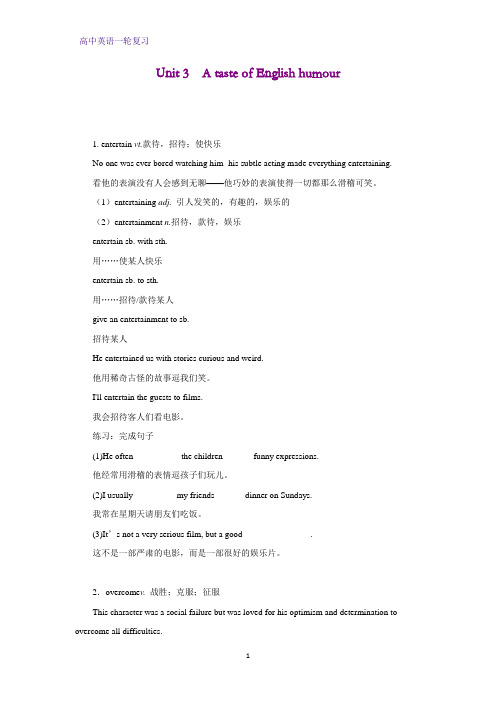
Unit 3 A taste of English humour1. entertain vt.款待,招待;使快乐No one was ever bored watching him -his subtle acting made everything entertaining.看他的表演没有人会感到无聊——他巧妙的表演使得一切都那么滑稽可笑。
(1)entertaining adj. 引人发笑的,有趣的,娱乐的(2)entertainment n.招待,款待,娱乐entertain sb. with sth.用……使某人快乐entertain sb. to sth.用……招待/款待某人give an entertainment to sb.招待某人He entertained us with stories curious and weird.他用稀奇古怪的故事逗我们笑。
I'll entertain the guests to films.我会招待客人们看电影。
练习:完成句子(1)He often __________ the children ______ funny expressions.他经常用滑稽的表情逗孩子们玩儿。
(2)I usually _________ my friends ______ dinner on Sundays.我常在星期天请朋友们吃饭。
(3)It’s not a very serious film, but a good _______________.这不是一部严肃的电影,而是一部很好的娱乐片。
2.overcome v. 战胜;克服;征服This character was a social failure but was loved for his optimism and determination to overcome all difficulties.这个角色是个社会生活中的失败者,但他乐观的精神和战胜困难的决心使他受到人们的喜爱。
英语:unit-3《a-taste-of-english-humour》课件(新人教版必修4)
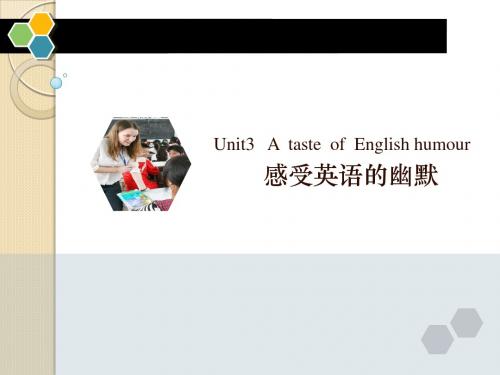
考纲知识预览
的 fortunately unfortunately fortune → adv.幸运地 → adv.不幸地→ ordinary n.机会,运气 bored boring 6. adj.平常的;普通 bore 的 entertain entertainment 7. adj.厌烦的→ entertaining adj.令人厌烦的→ vt.使厌烦 8. vt.& vi.使欢乐;款
(3)directly adv.直接地,也可作连词,引导 时间状语从句,意为“一……就……”。 ①The police officers had been directed to search the building. 警察奉命搜查这栋大楼。
名师一线讲坛
②Can you direct me to the post office? 你能指给我去邮局的路吗? ③At the sound of the gun,the birds flew in all directions. 听到枪声,鸟儿四处飞去。 ④Directly the teacher came in, everyone was quiet. 老师一进来大家都静了下来。 ⑤The next flight doesn’t go direct to Rome.It goes by way of Paris.下一
考纲知识预览
◦ 3.Unfortunately his father died, leaving the family even worse off,so Charlie spent his childhood looking after his sick mother and his brother.
高中英语 Unit 3 A taste of English humour 1 Warming Up

normal or serious into the unexpected or absurd.Humour in the form of
words may be either written or spoken.One of the most common kபைடு நூலகம்nds of
pleasure.A limerick is a short,humorous verse form consisting of five
lines usually with the rhyme scheme aabba;for example,
There was an Old Man who supposed
rather roundabout way,which has made him a family favourite.
译文:憨豆先生用一种迂回的、奇特的方式处理日常生活中的问
题,这使他成为一个家喻户晓的人物。
剖析:这是一个带有定语从句的复合句,which引导非限制性定语
从句,修饰整个主句。
单词注释
难句剖析
导读诱思
阅读短文,回答下列问题
1.What’s verbal humour?
答案:Verbal humour is the humour in the form of words.
2.What made Mr Bean a family favourite?
答案: His unique way of approaching everyday problems in a rather
Unit3 AtasteofEnglishhumour
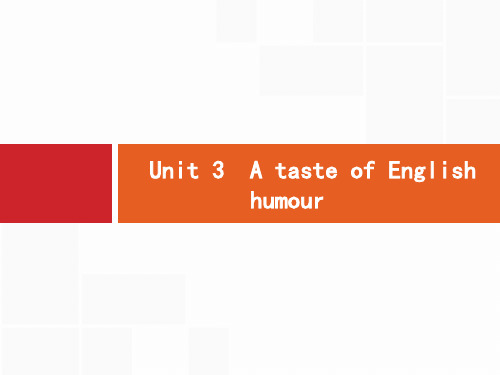
slpoorvts emdeet.for
his
Up to now,thousands of books
(send) to that school.
导演;指示op;指t挥imadij.sm and determination to overcome all difficulties.(Page 18) 这
on occasion偶尔,有时
on the occasion of值此……之际
on no occasion绝不
occasionally adv.偶尔
单句填空
①I only go there occasionally (occasion) because it’s too far away
from my house.
2.failure n.失败(者) ②Professor Zhu replied
to the President’s opening remarks.
①We finally managed to make the customers
(convince) of the quality of the vehicle.
Unit 3 A taste of English humour
必修4
Unit 3 A taste of English humour
核心考点
随堂巩固
-2-
高频词汇 难点句型
1.humour n.幽默;滑稽 [教材原句] A taste of English humour(Page 17)品味英语幽默 a sense of humour幽默感 humorous adj.幽默的 [巧记]汉语中幽默是humo(u)r的音译。 用humour的适当形式填空 ①Mr.John was so humorous that we had a good laugh over the
- 1、下载文档前请自行甄别文档内容的完整性,平台不提供额外的编辑、内容补充、找答案等附加服务。
- 2、"仅部分预览"的文档,不可在线预览部分如存在完整性等问题,可反馈申请退款(可完整预览的文档不适用该条件!)。
- 3、如文档侵犯您的权益,请联系客服反馈,我们会尽快为您处理(人工客服工作时间:9:00-18:30)。
Unit 3 A taste of English humourⅠ. 听录音,根据所听内容选择正确答案听第1~4段对话,分别完成第1~4题1. What time does the letter usually come?A. After 9:10.B. At nine or ten.C. Before 9:10.2. What’s the man doing the moment he answers the telephone?A. He is doing his homework.B. He is listening to music.C. He is turning down the music.3. Why does the woman think the book good?A. It solves many problems about study.B. Many of them are also reading it.C. It helps them a lot when they study.4. Where did the conversation most probably take place?A. In a plane.B. At a restaurant.C. At a store.听第5段听力材料,完成第5~7题5. What is the main topic of the passage?A. The Barcelona Olympic Games.B. TV programs on Chinese television.C. Effects of television on our life.6. According to a survey in Shanghai, how much time did young people spend on television each day?A. Two and a half hours.B. Three hours.C. Three and a half hours.7. Television is quickly taking the place of printed material as the major source of news for most Chinese. How do you know?A. There are about 185 million TV sets in China.B. A survey(调查)in Beijing found 63% of those surveyed got news from TV.C. There are news programs on television.Ⅱ. 听录音,根据所听内容判断正(T)误(F)1. The man is a director in the theatre.2. The directors don’t need to choose plays and actors.3. The man loves comedies very much.4. The timing is very important only for the movements.Ⅲ. 单项选择,从A、B、C、D四个选项中,选择最佳答案完成句子1. By far, there are many problems ________ to be solved.A. remainingB. remainedC. being remainedD. to remain2. Every Monday morning, students in our school would stand at attention, watching the national flag ________.A. raisingB. risingC. being riseD. being raised3. The food served at the new restaurant looked very ________, so every passer-by wanted to havea taste.A. invitedB. invitingC. to inviteD. being invited4. —Little Tom seemed to have much on his mind, what’s up?—He was caught ________ in the final exam this afternoon.A. cheatB. cheatedC. cheatingD. to cheat5. —What made Alice so upset?—________.A. Peter’s leaving without saying goodbyeB. Peter leaves without saying goodbyeC. Peter was leaving without saying goodbyeD. Peter had left without saying goodbye6. ________ in a heavy rain should be an unforgettable experience.A. CaughtB. CatchingC. Being caughtD. To catch7. The twins were so much alike; I could hardly ________ Tom.A. pick upB. pick outC. pick offD. pick at8. Not ________ with the high marks in the exam, the determined student aimed high to get full marks next time.A. proudB. curiousC. eagerD. content9. You’ll need to ________ them of your ability to do the job well.A. tellB. speakC. convinceD. persuade10. Traffic is bad, ________ in the city centre during the rush hours.A. particularlyB. terriblyC. mostlyD. normally11. The child ________ over there is my brother.A. standingB. standC. to standD. is standing12. Y ou’re going to England next year. Y ou should now practise________ English as much aspossible.A. speakB. to speakC. speakingD. speak about13. I heard him ________ the door.A. lockingB. to lockC. lockedD. being locking14. There is no point ________ further.A. argueB. to argueC. arguingD. being arguing15. Travelling is ________ but tiring.A. interestB. interestingC. interestedD. to interest Ⅳ.用所给单词或短语的正确形式完成下列句子worse off overcome entertain occasion throughout1. Unfortunately, her parents were laid off, leaving the family even _________________.2. You can hardly imagine _____________ that difficulty in a short time.3. The comedian must have said something _____________ as the audience were laughing from beginning to end.4. The news quickly spread _____________ the country and everyone was talking about it.5. I can remember every few _____________ when he refused to work because of ill health.Ⅴ. 补全对话,从框中所给的句子中选出适当的语句填入下面的对话中A. Personally, the most important thing is to use different techniques to make people laugh.B. Certainly.C. You know, I’m a comedian.D. What are you doing at this moment?E. I wish it would be the funniest I’ve ever shown.F. I plan to dress up as Santa Claus and give gifts to children.A: Mr Bean, I’m a reporter from CCTV. Can I ask you some questions?B: 1A: What do you think is of the most importance in your job: fame, success, or something else? B: 2 We usually don’t use any words. Our clothes, make-up and the way we act can create fun.A: 3B: I’m getting ready for an honour show. I have an act with a monkey. I’ve decided to act as if I were lovelier than the monkey. 4 That’s why I have worked very hard to prepare these days.A: Aha, I can’t wait to enjoy the show. What are your plans for your next show?B: 5 I intended to give my audience a one-hour show which is full of happiness.A: Thank you very much.B: Don’t mention it.1. 2. 3. 4. 5.Ⅵ. 完形填空Charlie Chaplin was born on April 16, 1889 in London. His father was a (n) 1 and although not one of the big names, he was doing very well. His mother Hannah was also an entertainer. A wonderful mimic(模仿者), she had a sweet, charming 2 . While they were by 3 means rich, the music hall provided the Chaplins with a comfortable living.Unfortunately, happy life didn’t last long. Father’s alcoholism was slowly, but surely4 his marriage. Finally it ended5 divorce, but Hannah was indomitable (不轻易认输的).6 her, Charlie Chaplin would have become just one more child7 in the poverty of Victorian London.8 she not only managed to keep Charlie and his brother Syney clean and warm, clothed and fed, but she thought up various ways to9 them. She would sit at the window watching the passers-by and guess their 10 from the way they looked and behaved, making up stories to amuse them.Charlie 11 her skills and went on using them all his life.Charlie had always believed, even in the worst times, that something special had locked away inside him. He 12 his courage and went to see one of the top theatrical agents. With no13 at all, he was offered the 14 of Billy—the pageboy in a new production of Sherlock Holmes. Sherlock Holmes opened on July 27, 1903 at the enormous “Pavilion Theatre”. Charlie seemed to become 15 overnight. It was as if he had found the thing he was meant to do.Charlie’s first film, released in February 1914, was called Making a living. Though it didn’t satisfy Charlie, the public liked it. After that he had made ten films and he had learned a lot. The public loved him and distributors were demanding more and more Chaplin films. In an incredibly short time, Charlie had become a very important man in motion picture.1. A. conductor B. teacher C. entertainer D. worker2. A. voice B. sound C. noise D. figure3. A. all B. no C. every D. none4. A. destroying B. hurting C. wounding D. harming5. A. with B. up C. in D. at6. A. Except B. Without C. Besides D. With7. A. gone B. separated C. divided D. lost8. A. Somehow B. Somewhat C. Therefore D. Otherwise9. A. feed B. please C. scold D. blame10. A. appearance B. expression C. character D. nationality11. A. took in B. brought in C. picked up D. turned up12. A. found B. collected C. discovered D. notice13. A. money B. help C. experience D. education14. A. name B. part C. actor D. chance15. A. respectable B. knowledgeable C. comfortable D. recognizable Ⅶ. 阅读理解,根据短文内容选择最佳答案(A)I have been trying to get sick. I don’t wear a sweater when I should, and two days ago Iwalked in the rain without my boots and my feet got soaked(浸泡). But so far nothing has happened. Debbie once told me about a girl in her cabin at camp who liked to stay overnight in the infirmary(医务室). She used to rub the end the thermometer(体温表)until it went up to 102. Then she’d stick it in her mouth and the nurse would think she was really sick.This morning I tried doing that but it never went above 94 after I rubbed it for ten whole minutes. So I held the tip to the thermometer next to the light bulb in my desk lamp and it went up 105. I figured I’d put it in my mouth and walk downstairs like that. Then my mother would take it out and wouldn’t she be surprised when she saw what a high fever I had!The only trouble was I didn’t know the thermometer would be so hot. As soon as I put it into my mouth I burned my tongue. Something awful! I spit the thermometer on the floor but it didn’t break. I will have to think up a better way to get mother and father back together. I can’t waste my time trying to get sick.1. How does the author try to get sick?A. She walks in the rain without her boots.B. She doesn’t wear a sweater when she should.C. She plays in the hot sun.D. Both A and B.2. The girl Debbie talked about pretended to be ill _______.A. so that she could have a restB. so that she could sleep in the infirmary at nightC. so that she would not work the next dayD. because she was mad3. When the author put the hot thermometer in her mouth, _______.A. she dropped it downB. the thermometer brokeC. her mouth felt hotD. she burned her tongue4. She has been trying to get sick because ______.A. she doesn’t want to go to schoolB. she misses her parentsC. she hates her motherD. both A and B(B)A funny thing happened to me when I was in Spain. Two Spanish words sounded the same to my American ears. These words were “sangria”and “sonrie”. “Sangria” is a type of wine. “Sonrie” means smile.One day, a man came to visit our house. He looked at my shy, serious face and sa id, “Sonrie, please (Smile, please).” I thought the man wanted a glass of sangria.“Now?” I asked him.“Of course now, ” he answered.“Sure,” I said to him, “one moment.” I went to the kitchen and returned with some sangria and two glasses.The man looked rather surprised. “Do Americans have to drink sangria before they can smile?” he asked. But I misunderstood his question. I thought the man asked, “Do Americans drink sangria?”“They certainly do,” I said.And we were both very confused as we drank sangria.5. The main idea of this passage is __________A. Americans can’t learn a foreign languageB. Spanish people think American people are crazyC. the author had a funny misunderstanding in a foreign languageD. people make mistakes when they drink sangria6. Which of the following sentences is TRUE according to the passage?A. Americans have to drink some wine before they can smile.B. “Sangria” in Spanish means “smile”.C. The author was a serious person.D. The author was an American visiting Spain.7. The author took out some sangria from the kitchen because __________.A. his guest could do with itB. a close friend came to visit himC. he made himself misunderstoodD. he misunderstood the man8. In your opinion, which of the following sentences is probably TRUE?A. The author spoke Spanish in Spain for many years.B. The author was just beginning to speak and understand Spanish.C. The man knew the author misunderstood Spanish.D. The ma n was a close friend of the author’s.Ⅷ. 书面表达你们班在英语课上讨论“What are the advantages and disadvantages of public transportation?”你所在的小组主要就公交车进行了讨论。
